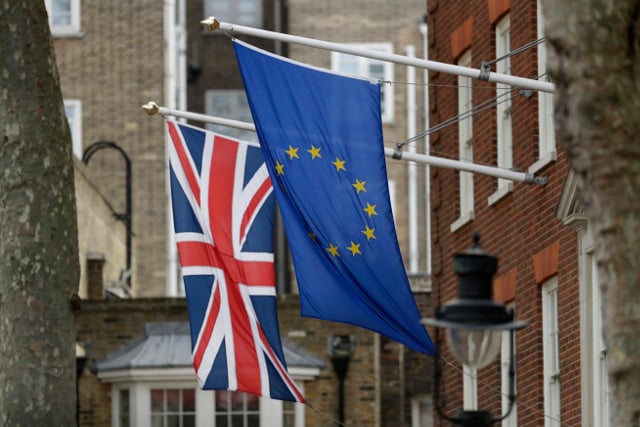In a video shared by the embassy's Facebook page on Monday, Acting Ambassador Peter Ruskin acknowledged that it was an “uncertain time” for British citizens living in the EU, and said that the government would prefer to leave the EU with a deal.
“If it's not possible to reach a deal we will have to leave with no deal – and are making all necessary preparations to do so,” he said.
While the update did not include any new decisions or policies, it provided information on what British citizens in Sweden would need to do in the event of both a deal and a no-deal scenario.
 British Prime Minister Boris Johnson pictured leaving 10 Downing Street in London. Photo: AP Photo/Kirsty Wigglesworth
British Prime Minister Boris Johnson pictured leaving 10 Downing Street in London. Photo: AP Photo/Kirsty Wigglesworth
No-deal grace period
If the UK leaves without a deal, Sweden has committed to a one-year grace period for British citizens.
This means that for one year from the date the UK leaves the EU (October 31st, 2019), Brits would retain the same rights to live, work, access healthcare, and study in Sweden without a residency or work permit.
The exemption will apply automatically, so Brits and their family members do not need to make special applications in order to continue living and working as normal immediately after any no-deal Brexit.
READ ALSO: Essential no-deal Brexit checklist for Brits in Sweden
Residency permits
The embassy said that “the key thing” was that Brits would need to apply for residency permits during this one-year period.
“This would enable you to keep your rights after the grace period has ended. In this scenario, it would be your responsibility to apply for residency, if you want to continue to live in Sweden with the rights that you have today,” stated Ruskin. Those who have already applied for Swedish citizenship but not yet received a decision by the date of any no-deal Brexit have been advised they should apply separately for residence.
However, it remains unclear whether current regulations around work and residence permits would apply (including requirements for certain income thresholds and workplace insurance), or whether the government would introduce new legislation to deal with the affected Brits. Both the Migration Agency and Sweden's largest major business federation have warned that applying existing legislation to Brits would be problematic.
It's also unclear what rules would apply to self-supporting Brits, including pensioners as well as those who do not have a job or Swedish partner during the one-year grace period.
When The Local spoke to Sweden's EU Minister Hans Dahlgren in March, he said he was unable to guarantee what the status of Brits in Sweden would be one year after a no-deal Brexit, including for Brits working in companies that do not meet the conditions required to offer third-country work permits, for example smaller startup companies without a collective bargaining agreement (kollektivavtal).

EU Minister Hans Dahlgren, right, next to Prime Minister Stefan Löfven. Photo: Pontus Lundahl/TT
The minister added: “I'm sure that during the negotiations that follow, we'll make every effort to facilitate for UK citizens now living in Sweden to have as easy an access to this country as possible. But the details of this have to be worked out during this grace period. A lot of things can be done in one year and if there are remaining problems I'm sure they can be worked out.”
As for those who have not yet been in Sweden long enough to apply for permanent residence or citizenship (between three and five years, depending on your situation and subject to certain criteria), the Swedish parliament in July approved legislative changes which mean Brits and their family members can count their time in Sweden under EU freedom of movement towards a future residence permit application. In other words, the clock would not restart once they became a third-country citizen on October 31st, 2019.
READ ALSO: Sweden fast-tracks citizenship applications from Brits as Brexit negotiations continue
Passport stamps
Another thing to be aware of is that during the one-year grace period, British citizens in Sweden and their families have been advised to request a special passport stamp to prove their status.
This will be provided free by the Swedish Migration Agency if and when it becomes clear that the UK will leave the EU without a deal. If this happens, both the Migration Agency and the British Embassy will update their information and provide details of exactly how to apply.
The Migration Agency has previously said it hopes to process applications for stamps within one week.
READ ALSO: How the Swedish Migration Agency is preparing for a no-deal Brexit

A Migration Agency office in Småland, southern Sweden. Photo: Adam Wrafter/SvD/TT
If the UK leaves with a deal
The measures outlined above apply only if the UK leaves the EU without a deal. While Ruskin stressed that leaving with a deal was the government's preferred outcome, new Prime Minister Boris Johnson has said he is prepared to leave without a deal.
If the UK leaves the EU with a deal, EU member states and the UK have agreed on an 'implementation period', which is planned to last until December 31st, 2020. During this time, British citizens would retain their current rights as EU citizens.
This means that not only would those already living in Sweden keep their right to live, work, access healthcare, and study in Sweden, but that they could also travel freely throughout the EU (without the need for a passport stamp), and also that British citizens could move to Sweden, or any other EU country, under the EU's freedom of movement until the end of 2020.
During that period, negotiations between the UK and EU would be carried out which would determine the future relationship between the countries.
READ ALSO: Confused about Brexit? Here are 8 essential websites for Brits in Sweden




 Please whitelist us to continue reading.
Please whitelist us to continue reading.
Member comments